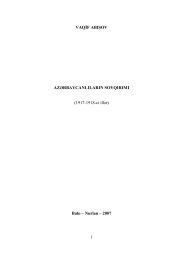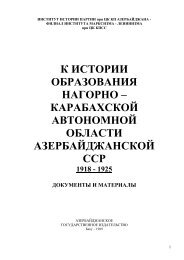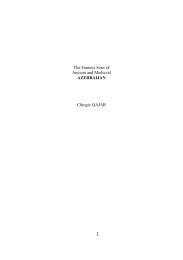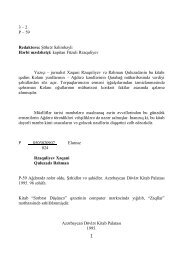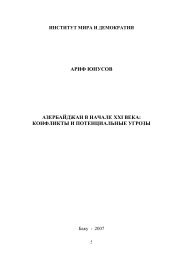ARMENIAN - Erevangala500
ARMENIAN - Erevangala500
ARMENIAN - Erevangala500
Create successful ePaper yourself
Turn your PDF publications into a flip-book with our unique Google optimized e-Paper software.
An Equally Tragic Sequel on the<br />
Southern Front<br />
The murderous Armenian uprisings o f Mush and Van in<br />
1915 had amounted to the opening o f another front<br />
against the Ottomans within the borders o f the Empire.<br />
Under these circumstances, the Ottoman government had<br />
seen it necessary to protect the threatened part o f Anatolia<br />
by moving the Armenians elsewhere. Several hundred<br />
thousand Armenians ended up in Syria. Almost as soon as<br />
the Armistice o f Mudros was concluded, these people<br />
started streaming back to their original homes. Their<br />
intention now was to found a new Cilician-Armenian<br />
state, but in the region where they wanted to have this<br />
state they were just as much a minority now, after the war,<br />
as they had been before it. Since it is not possible to go<br />
into the events o f this secondary theater o f war in more<br />
detail, a description o f a single episode will have to suffice.<br />
This episode illustrates the dimensions o f a campaign<br />
that was supposed to "recall the tradition o f the<br />
Crusades" (and unfortunately did so): After the French-<br />
Armenian invaders had been thrown back by the Turks,<br />
Marsin and Taurus were once again in the hands o f their<br />
inhabitants, who were not about to have French-<br />
Armenian rule forced upon them. A gang o f Armenian<br />
fanatics, however, decided to declare the region between<br />
the Sehun and Jehun rivers "selfgovem-ing".<br />
The ringleader o f this ridiculous operation was Mihran<br />
Damadjian, a terrorist who had grown old disgracefully.<br />
He had won his first bloody laurels inciting rebellions in<br />
Sasun.<br />
When the French tried to put him in his place, he declared<br />
an "independent Armenian state o f Cilicia" on August 5,<br />
1920. With a handful o f blindly loyal followers, he occupied<br />
the 'Palais des Gouvemeurs' o f Adana in terrorist<br />
fashion.<br />
As representative o f the "Armenian National Delegation"<br />
(whatever that might have been in Cilicia), he declared<br />
him self "Armenian governor under French protectorate".<br />
This unfortunate farce ended an hour later, when the<br />
French commanding officer asked him and his "government"<br />
in no uncertain fashion to end "cette comedie ridicule"<br />
as soon as possible.<br />
The French ended their Cilician adventure shortly thereafter.<br />
On December 11,1918, a French battalion made up o f<br />
four hundred Armenians had occupied Dortyol, the notorious<br />
region o f Armenian rebellion surrounding Musa<br />
Dagh and Zeitun.<br />
On January 20, 1920, the French began pulling out o f<br />
Ma-rash. (On February 6 the patriarch in Istanbul sent a<br />
telegram to Paris saying that two thousand Armenians<br />
had been "massacred" by the Turks; on February 25,<br />
Reuters sent a telegram around the world saying that the<br />
Turks had slaughtered 70,000 [seventy thousand!]<br />
116<br />
Armenians in Marash . . .) It is true that the fighting on<br />
Turkey's southern flank was taking on a genuine warlike<br />
character, even if the situation did not resemble the<br />
rumors that Reuters was peddling, apparently still in the<br />
tradition o f wartime slander.<br />
The fighting was in fact taking place between the best-<br />
equipped Armenian units and recently resurrected Turkish<br />
troops led by their efficient government in Ankara.<br />
They made up for their lack o f equipment and means of<br />
transport with love for their country. On October 20,<br />
1921, an agreement was signed between the Turkish government<br />
and M. Franklin-Bouillon, representing France.<br />
It called for the unconditional withdrawal o f French<br />
troops.<br />
The overwhelming majority o f the Armenian population,<br />
which had just moved back to Cilicia in 1918, joined the<br />
French in their withdrawal. This happened in spite o f the<br />
fact that the Armenians in the South o f Turkey were a<br />
valuable part o f the Turkish community and would have<br />
been just as welcome as the Armenians were everywhere<br />
else in Anatolia.<br />
All the facts indicate that the emigration en masse o f the<br />
Armenians from Cilicia was planned and programmed<br />
with a single goal in mind. Someone wanted to prove to<br />
the "dumb, incompetent Turks" that things "simply would<br />
not work" without the Armenian element. Trade -especially<br />
international trade - would surely fall apart permanently.<br />
But what happened was just the opposite. The tremendously<br />
capable Armenians settled by the hundreds of<br />
thousands in all the nations that were founded out o f the<br />
old Ottoman Empire. (They had not been moved out in<br />
1915; they had just been moved around]) None o f these<br />
other nations, however, could possibly stand comparison<br />
with the progress made in Turkey. Only Turkey has managed<br />
to build the road to a safe, peaceful present, with a<br />
virtually certain option on an even better, peaceful future.<br />
The other states, Syria and Lebanon in particular, have<br />
meanwhile sunk into a sea o f blood and terror (o f which<br />
no small part is contributed by Armenian terrorists).<br />
Speaking o f Lebanon:<br />
The French supreme commander in Cilicia, General<br />
Dufieux, was a notorious Turk-hater. Right up to the last<br />
moment, he avoided making contact with even a single<br />
Turk. He left Adana on November 24,1921. Just before<br />
his departure, he visited the French war cemetary, and as<br />
he laid down the obligatory wreath he said sadly: "To the<br />
French soldiers who sacrificed their blood in vain."<br />
He could almost have been saying those words vicariously<br />
for all the French people who wish to remember the<br />
victims o f terror in Lebanon and the victims o f the<br />
Lebanese disaster. The incomprehensible waves o f terrorism<br />
from Lebanon have in the meantime reached France<br />
and Paris, claiming countless innocent victims. They are<br />
in fact all exclusively victims o f a French policy that held<br />
that France could win power and influence in the



